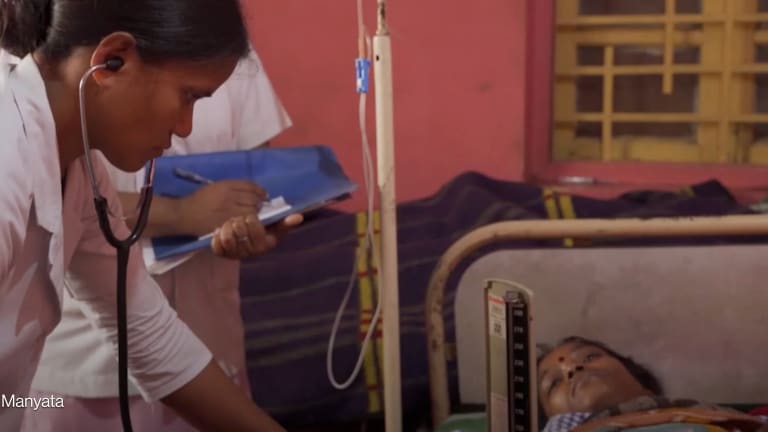
As we enter 2024, the world is not on track to achieve the health-related targets of the Sustainable Development Goals. While maternity mortality has dropped 34% worldwide from 2000 to 2020, in 2020 it was estimated 287,000 women globally died from a maternal cause, many of which are preventable. Reductions in maternal mortality rates have stagnated in recent years, due largely to factors from the COVID-19 pandemic which caused the disruption of health services and access to care.
Local private sector enterprises can act as an additional mechanism to address critical health care system gaps and market health failures and catalyze economic growth for investments. As of 2020, there is over $240 trillion in funding available from capital markets. Mobilizing just 1% of this would address the entire SDG funding gap.
At the 78th session of the United Nations General Assembly, a panel discussion evaluated how to achieve sustainable approaches to improve maternal health and achieve universal health care through strategic private-sector collaborations. Dr. George Jnr. Uzonwanne, director of the Niger Delta Development Commission, and Mara Hansen Staples, founder of health care consulting firm Salient Advisory, were two of the panelists who helped raise awareness and share examples of effective collaboration between governments and the private sector to improve quality and access to health care — because the lives of millions depend on it.
Below are some of the important points raised during the discussion.
Leverage the private sector to help solve some of the world’s greatest health challenges
For many years, the private sector and governments worked in silos when it came to health care, with much of the burden being left solely on governments’ shoulders. To improve outcomes and advance the SDGs, we need to question how the private sector can best support government representatives, who are still driving much of the care in the health system.
As emphasized by Dr. Uzonwanne during the panel, governments might not necessarily have all of the expertise or capacity needed to bring in the efficiencies of the private sector. People expect governments to provide health care services, but the reality is that health care is a business, and that’s the number one aspect where we need to start reinventing our minds.
“Health care is a business and should be treated as one. If we use the efficiencies of the private sector to run that, we’ll achieve more.”
— Dr. George Jnr. Uzonwanne, director of education, health and social services, Niger Delta Development CommissionExperiences discussed by panelists highlight how governments can call upon the contribution of the private sector in many ways, such as expanding services for mothers and newborns. For example, private sector commitments from MSD for Mothers, MSD’s global initiative to help create a world where no woman has to die while giving life, have helped to explore novel financing approaches to address maternal mortality and help progress improved solutions around the world, through diverse collaborations reaching the local level.
This commitment impacts women’s lives in real-time, while also strengthening health systems for sustained impact on how health care is delivered today and tomorrow.
Utilizing data is key to unlocking and implementing needed solutions
During the panel, Dr. Uzonwanne stressed the important role of utilizing data. To help improve care, there is a need for more evaluation on how to better integrate digital innovations into health systems. Digital systems and data tools are becoming increasingly efficient and there is heightened demand for their use by governments. While a myriad of innovations have become available, achieving widescale access and implementation by governments remains a challenge. This is in large part due to persisting silos across the public and private sectors.
That said, there have been important strides made to begin meeting the increased appetite and interest from both local and national level governments. In particular, data has begun to assist with allocating scarce resources and ensuring allocation is done equitably and efficiently to get care where and when patients need it.
This effort is prevalent in addressing gaps in prenatal care. For example, the Niger Delta Development Commission is working with the private sector with a long-term goal to register nearly 10 million women in the Niger Delta to have access to health care at the primary care level. By registering these women and collecting this data, including their demographics — who they are, where they live, what they do, why don’t they have access to care, why they can’t afford care —providers can use that data to plan care properly.
How MSD is leveraging innovative finance to advance health equity
Devex sat down with Carmen Villar, the vice president of social business innovation at MSD, to learn more about MSD’s impact investment strategy and how it's helping to advance health equity.
By being able to aggregate data from mothers throughout their pregnancies, the health care sector can more easily create and provide dashboards for county governments. This, in turn, can help improve care, reduce complications, and ultimately decrease maternal mortality.
How can we progress the needed scale for new technology and innovations?
Mara Hansen Staples, founder of Salient Advisory — an organization that tracks the emergence of health tech companies across the African continent — observed a critical gap that her organization has set out to solve. In 2020, hundreds of tech companies across Africa were launched during the COVID-19 pandemic in an attempt to improve the access, quality, and affordability of care. However, we know that African health-tech innovators are operating in difficult environments and often fail to achieve impact at scale.
In 2022, Salient Advisory launched Investing in Innovation, or i3, in collaboration with the Bill & Melinda Gates Foundation, MSD, Cencora, Microsoft, and Chemonics to jointly identify and support leading African startups working to improve health care supply chains, with a focus on startups led by women.
The main goal of the program is to create connections between leading startups and public health institutions. In the first year, the team noticed that startups were more successful in landing collaborations with governments than any other type of partner in public health, and Salient’s broader research suggests that this trend holds true across the African continent.
In fact, Hansen Staples noted there are now more than 50 such partnerships between tech-driven startups and national or subnational governments in health care supply chains. Many of these partnerships are focused on deploying innovations in order and inventory management, in which governments are trying to ensure that local clinics, hospitals, and pharmacies have greater availability, affordability, and accessibility of essential products for maternal health and more.
“In the area of health care supply chains, there are now more than 50 different partnerships between health-tech innovators and leading governments on the continent.”
— Mara Hansen Staples, founder, Salient AdvisoryOther global health institutions, from NGOs to donors, should follow the lead of forward-thinking governments in leveraging the private sector, including African-led, tech-driven startups. To do so, NGOs, global health institutions, donors, and industry need to adapt our approach to sourcing and structuring partnerships, to build more robust local health markets, generate high-value jobs, and advance progress against the SDGs.
As governments, NGOs, the private sector, and other players in the space, let us continue to raise women’s voices to the forefront of the health system, to ensure all mothers are experiencing safe and respectful childbirth and have access to ongoing care.
Watch the full panel session “All In: Sustainable Approaches to Improve Maternal Health and Achieve UHC” here.
For more commentary on the ways countries can engage with the private sector and thereby advance equitable access to high-quality, respectful maternal health care, check out a recent article discussing how private-public collaboration can advance access to care.
The Funding the Future series is supported by funding from MSD, through its MSD for Mothers program, and is the sole responsibility of the authors. MSD for Mothers is an initiative of Merck & Co. Inc., Rahway, New Jersey, U.S.A.
Join the conversation on finding private sector solutions to improve health service delivery for reproductive, maternal, newborn, child, and adolescent health, or RMNCAH.










